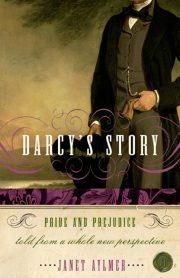I felt that Darcy seemed to be one person at the beginning of Pride and Prejudice, and quite another at the end. People do not really change that much, so it was more likely that he had been acting a part to some extent, concealing some inhibition or aspect of his real character.
Jane Austen had Darcy say in her novel that “. ...I cannot forget the follies and vices of others so soon as I ought, nor their offences against myself...My temper would perhaps be called resentful. My good opinion once lost is lost for ever.” His wariness of Mr. Wickham, son of his late father’s steward, was confirmed by Wickham’s attempts to get more than he was due from Darcy’s father’s estate. That wariness had developed into dislike and distrust before Wickham tried to elope with Darcy’s younger sister, Georgiana, to get control of her fortune.
Darcy’s disdain for the Court at St. James and his dislike of mixing with people strange to him seemed to be due to the fact that he was not at ease in unfamiliar company, and envied other young men’s ability to converse with and charm the opposite sex, rather than that he was naturally unpleasant to other people.
I took this as my cue, that he was envious of the easy manners of many of the people he knew, especially the men of about his own age such as Wickham, his cousin Fitzwilliam, and his friend Bingley.
Darcy seemed to me to be a strong person. He could take swift action when he chose, as when he resolved the elopement of Elizabeth’s sister Lydia with Wickham.
Jane Austen herself describes Darcy as being a good brother to Georgiana, as being at ease with people he knows well, and as being generous to the poor in Derbyshire. If you like, his unattractive manners in the earlier part of the story concealed a very pleasant character waiting to emerge, if the right person came along to help him escape his haughty relations and gain confidence that he could find the happiness he sought in marriage.
I decided that Darcy was unlikely to have reacted favourably to the news that Elizabeth might have married Mr. Collins, since Jane Austen made it clear that they had very little in common except for Darcy’s formidable aunt, Lady Catherine De Bourgh.
But he was likely to learn about that proposal, sooner or later, from someone in the Bennet family who was aware of it. But Mr. Collins did do Darcy an unintentional favour, by telling his aunt about the impending marriage between Jane Bennet and Mr. Bingley. His concern that a union between her nephew and Elizabeth might follow led her to her famous interview with Elizabeth at Longbourn, and her subsequent visit to London to try and dissuade Darcy from the idea.
Every novel has a turning point, and Darcy’s Story is no exception. Darcy’s sister Georgiana seemed to me to have reached marriageable age in a story set in the 19th century, as had Elizabeth’s youngest sister Lydia. Georgiana was therefore at the point when she was changing from being Darcy’s responsibility to becoming more his contemporary. So talking to Georgiana about his troubled frame of mind, after his first unsuccessful proposal to Elizabeth, fitted the story, and I made that the turning point in Darcy’s “journey” to win the hand of the woman he loves.
About the Author
Janet Aylmer is the pen name of an English Jane Austen enthusiast who lives in Bath.


"Darcy’s Story" отзывы
Отзывы читателей о книге "Darcy’s Story". Читайте комментарии и мнения людей о произведении.
Понравилась книга? Поделитесь впечатлениями - оставьте Ваш отзыв и расскажите о книге "Darcy’s Story" друзьям в соцсетях.